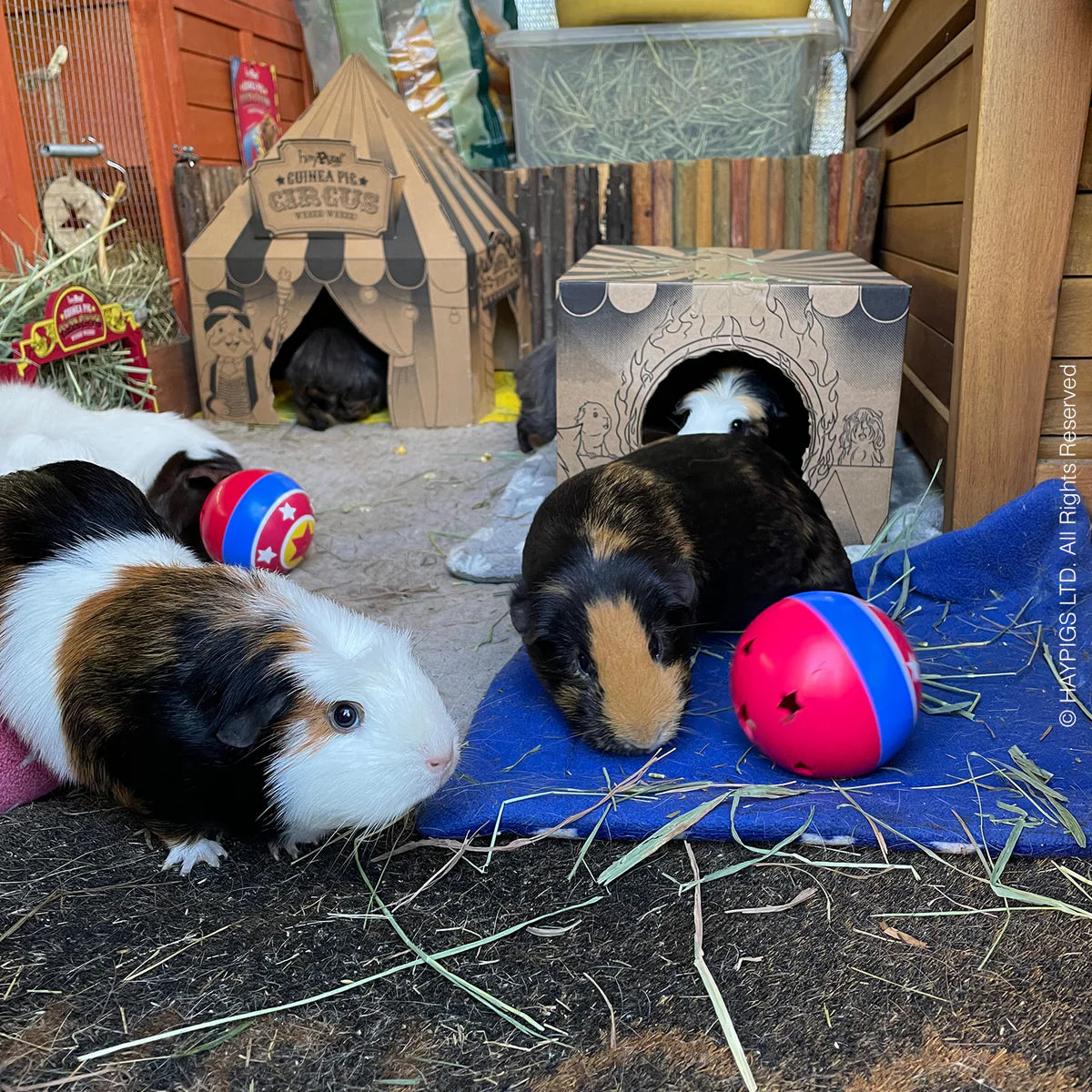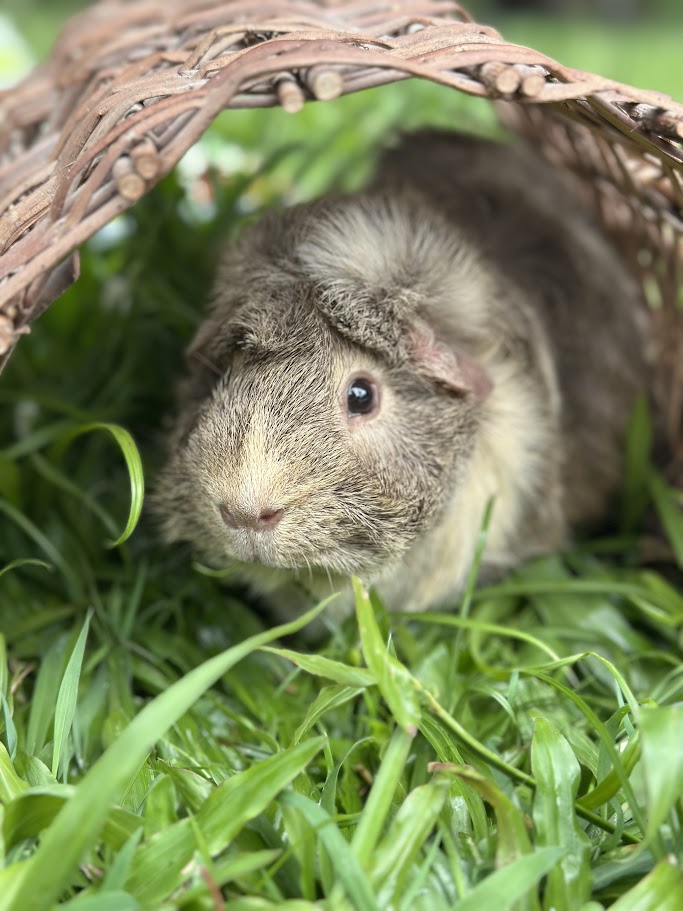Exercise
Exercise = Happy, Healthy Piggies!
Guinea pigs need daily exercise to stay healthy and happy. A spacious cage is a great start, but they also benefit from extra time to stretch their legs.
Floor time or supervised outdoor play gives your piggies a chance to explore, run zoomie laps, do piggy trains, and pop around with joy! These activities aren’t just cute — they help your cavies stay fit and let them express their natural behaviours.
Bonus: It’s also a great way to bond with your floofs!

How Often?
Floor time should preferably be done as often as possible (ideally once a day), and the longer they are out, the better!
Guinea pigs which are housed in smaller cages will need regular exercise time outside their cage to ensure they remain fit and healthy, as they won't be as active with their regular cage space. See more on ideal cage sizes for your piggy clan here.
INDOOR FLOOR TIME
-
✔️ Indoor floor areas should:
- Provide adequate space and be considerably larger than their normal cage area
- Allow supervision and interaction
- Provide sufficient lighting
- Be well ventilated
-
❌ Indoor Floor time areas should NOT:
- Be humid/hot or in constant direct sunlight
- Have constant fluctuations in temperature (like laundries)
- Be drafty
- Be isolated from family activity and adequate supervision
- Be near stairs, balconies or verandahs where piggies could fall and injure themselves.
- Be situated near dangerous chemicals and fumes (like a garage with a stored car)
(Image credit: HayPigs)


Floor Time
Once a suitable location has been allocated for floor time, there are some important guidelines which must be followed to protect your piggies and your household. It is vitally important that you always make any area where you let your piggies have floor time is completely safe, secure and free of any hazards.
Some guinea pigs can be litter trained, which can help in minimise accidents during floor time (we do recommend a backup plan though as this isn't always a reliable method!).
Watch Those Wires!
Guinea pigs love to nibble — and that includes phone cords and power cables! Chewing on wires can cause electric shocks or dangerous blockages if they swallow the plastic coating.
To keep your piggies safe during floor time, make sure all cords are either:
• Removed from the area
• Tied up out of reach
• Blocked off with grids or something solid they can’t get past
Better safe than sorry when it comes to curious little teeth!
Tiny Spaces = Big Trouble!
Guinea pigs are escape artists — they can squeeze into surprisingly small gaps, even under fridges, cupboards, and bookshelves. Their flexible bodies allow them to fit into places you’d never expect!
To keep them safe, block off any tight spaces they could crawl into. If they get stuck or refuse to come out, it can be stressful (for both of you!). Use sturdy barriers like wire grids, cardboard boxes weighted with books, or anything solid they can’t move or push through.
Also double-check their enclosure is secure and that they can’t sneak into off-limits areas or out open doors during floor time!
Floors should be protected with a material that is easily disposable or washable, easy to set up, and provides adequate protection.
Newspaper is a perfect floor time tool and should be placed on top of any flooring. Shower curtains, bath mats and old towels can also be used in conjunction with newspaper, by placing on top of existing flooring. The key to having a daily floor time routine as an easy set up.
Supervision is a must during floor time. You must always keep an eye on your piggies during floor time, even with the above safety measures in place. Regular checks must always be done, especially if your guinea pig has had floor time for a few hours. Food and water levels should be monitored, as well as the general well-being of your guinea pigs.
Here’s an example of a simple floor time setup in a living room, using newspaper to protect the flooring:
- Remove any hazards like cords, and block off tight spaces using wire grids or sturdy barriers.
- Lay down a shower curtain (great for carpets!) and hold it in place with bricks or heavy items.
- Cover the shower curtain with two layers of newspaper for easy cleanup.
- Move some accessories from their cage into the floor area. Familiar scents help your piggies feel more at ease.
- Add hiding spots (like igloos, tunnels or boxes), plus water and hay — they should always have access to both.
- Gently place your guinea pigs into their floor time space and let them explore!
- Once floor time is over, return your piggies and their accessories to the cage.
- Roll up and dispose of the newspaper, wipe down the shower curtain, and fold it away somewhere handy for next time.
OUTDOOR RUN TIME
If your guinea pigs usually live indoors, giving them some supervised outdoor time can be a real treat! Fresh grass, new sights and smells, and a little sunshine all make for an enriching experience — plus, it’s a natural way to soak up some vitamin D.
⚠️ Important for Aussie Piggy Parents:
Outdoor time is best saved for the cooler months. Australian summers can reach extreme temperatures — sometimes over 40°C — which is dangerous and potentially deadly for guinea pigs. In hot weather, heatstroke can set in within just 10 minutes.
Quick rule of thumb: If it’s too hot or cold for you to be comfortable outside, it’s not safe for your piggies either.
-
📍 Location
Choosing the correct location for outdoor time for your piggies is very important, as it can be a risk to their health and life to have a run in the wrong location!
First and foremost, outdoor runs should only be used during the day. Night time poses a lot more predator threats and is unsafe for your piggies as you won't be monitoring them constantly.
Please note, if the weather is hot (particularly in Australia), do NOT leave your guinea pig outside all day, as they will suffer and potentially die from heat stress! -
✔️ Outdoor runs should:
- Provide adequate space and be roughly the same, if not larger than their normal cage area
- Be contained and secure (a playpen or outdoor piggy run is ideal)
- Allow supervision and interaction with hoomans
- Has areas of shade and sun. If it's summer, limit outdoor exposure completely, or at the very least, make sure it's in 100% shade and only for a short period!)
- Is protected from predators (wire netting or mesh over the entire area apart from the floor is recommended)
- Still have access to hay and water at all times
- Contain hideys, tunnels and boxes with good air flow to avoid overheating
-
❌ Outdoor run areas should NOT:
- Have wired bottoms. A lot of guinea pig outdoor 'runs' on the market have wired bottoms, which can lead to foot injuries and conditions like bumblefoot. For the sake of your pets comfort and health do not buy these enclosures!
- Be humid/hot or in constant direct sunlight - at least 50% natural shade or 100% shade if the weather is warm.
- Be easily upturned for guinea pigs to escape or predators to get into
- Be open-topped to then be left unsupervised. If you have an open playpen, always stay nearby while your pets are out, as birds and cats can easily get in if left unmonitored.
It's important, regardless of the run/pen you use, to constantly supervise your guinea pigs while they are outdoors, to ensure they are comfortable, happy and safe.




















